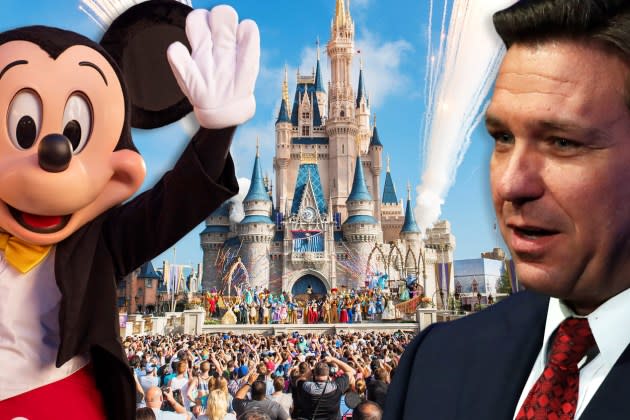Disney Accuses Ron DeSantis And Allies Of Un-American “Ongoing Constitutional Mutiny” In Latest Legal Volley Over Theme Park District
- Oops!Something went wrong.Please try again later.
- Oops!Something went wrong.Please try again later.

The Walt Disney Co. accused Florida Governor Ron DeSantis and his allies of being engaged in “ongoing constitutional mutiny” for targeting the company over its opposition to a parental rights bill, known by detractors as the “don’t say gay” law.
In its latest filing in the company’s federal lawsuit against the governor and presidential candidate, Disney’s legal team wrote that DeSantis and his allies “openly reject the foundational First Amendment rule that a state cannot deploy its official powers to punish the expression of disfavored political viewpoints. Consistent with that outlook, their motion to dismiss rests explicitly on the premise that states are free to wield the ‘structure and composition’ of representative political institutions as cudgels against those who express opinions not acceptable to the ruling party.”
More from Deadline
“That premise is not just legally unsupported, it is profoundly un-American,” they wrote.
Read Disney’s latest Ron DeSantis brief and latest Central Florida Tourism Oversight District brief.
In its lawsuit and later amended complaint, Disney accused DeSantis and other state officials of violating the First Amendment when they moved to restructure a company-controlled special district that has governed Walt Disney World and surrounding properties for 55 years. DeSantis championed state legislation that gave him the power to nominate members of the special district board, renamed the Central Florida Tourism Oversight District. Board members of the district are also defendants in Disney’s litigation.
Disney’s latest filing asked a judge to reject a motion from DeSantis and the new special district board members to have the case dismissed. In it, Disney’s legal team argued that the company was “an especially prominent target of the State’s attacks on free speech, one with the resources to hold the State accountable for its wrongdoing. But if the State’s strategy succeeds, Disney will assuredly not be the last entity punished for espousing disfavored viewpoints. If the line is not drawn here, there is no line at all.”
Citing the Supreme Court’s 2010 ruling in Citizens United, Disney’s attorneys also said that First Amendment principles apply not just to individuals, but to businesses. While DeSantis has argued that the Disney-controlled special district gave the company special favors, Disney’s attorneys argued in the brief that the governor’s retaliation went beyond his effort to put the district under the state control. They noted that he “announced that the board might approve use of Disney-adjacent property for development of rival ‘amusement parks’ or even construction of a ‘state prison’—the ‘possibilities are endless.'”
A spokesperson for the governor did not immediately return a request for comment.
DeSantis and other state defendants have claimed that they are immune from Disney’s federal lawsuit.
The governor’s attorneys argued in August that he and another state official, the secretary of the Florida Department of Economic Opportunity, do not enforce the laws at issue in the case. The attorneys wrote, “Disney must do more than generalize: It must show that the State Defendants have specific, formal power to enforce the challenged laws, such that an injunction against them would ‘be effectual.’” They argue that DeSantis’s power to appoint board members to the special district and his “purported control” over their actions is insufficient to establish standing.
But Disney’s legal team challenged that claim of immunity. The company’s legal team wrote that “courts routinely enforce the Constitution to prohibit states from structuring government entities on impermissible bases. Were it otherwise, a state could redraw a city’s boundaries for the explicitly stated purposes of segregating voters by race or religion, or punishing city voters for electing the Governor’s rival as mayor, or wholly excluding one political party from local governance.”
The board of the special district sued Disney in state court, asking a judge to find that a set of company development agreements —approved by the special district board before it came under state control — were null and void.
Best of Deadline
2024 Premiere Dates For New & Returning Series On Broadcast, Cable & Streaming
10 Worst Fictional Presidents From Movies And TV Shows - Photo Gallery
Sign up for Deadline's Newsletter. For the latest news, follow us on Facebook, Twitter, and Instagram.

